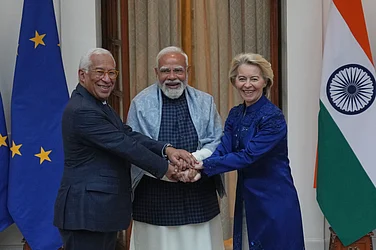The Delhi High Court has said that the mere smuggling of gold without any connection to a threat to the economic security or monetary stability of the country is not a "terrorist act" under the Unlawful Activities (Prevention) Act. A bench headed by Justice Mukta Gupta, while granting bail to nine persons arrested for allegedly smuggling over 500 gold bars weighing 83.621 kg from Assam to Delhi, said that even after an amendment to the definition of "terrorist act" under the UAPA, 'gold' was not added to Section 15(1)(a)(iiia) which defines the act in the context of damage to the monetary stability of India by smuggling, etc. of high quality counterfeit Indian currency, coin or of any other material.
The bench, also comprising Justice Mini Pushkarna, further noted that the possession, use, production, and transfer of counterfeit currency or coin was, per-se, illegal but production, possession, use, etc. of gold was not, and even import of gold was not prohibited but restricted subject to prescribed quantity on payment of duty. The court directed the accused persons (appellants) to furnish a personal bond and a surety bond in the sum of Rs 1 lakh each and keep their mobile phones active and also share the live locations of the devices with the investigating officers for the next six months.
"The amendment was made to the definition of “terrorist act” by bringing in facets of terrorist acts by disturbing the economic stability of the country. The said amendment has been made pursuant to the recommendations of the Financial Action Task Force (in short FATF)… However, it may be noted that despite the fact that the report specifically deals with gold, the word 'gold' have not been added while amending Section 15(1)(a)(iiia) UAP Act,” the court said in its order dated June 3.
“Thus mere smuggling of gold without any connection whatsoever to threatening economic security or monetary stability of India cannot be a terrorist act,” the court stated. The court considered that the trial was likely to take some time and some of the appellants have filed petitions challenging the sanction order on the ground that an alleged offense under the Customs Act cannot be brought in the realm of provisions of the UAPA, and said that it “deems it fit to grant bail to the appellants”.
The court asked the appellants to surrender their passports, not leave the country without prior permission of the trial court and also periodically report to the jurisdictional police station. A case was registered by the National Investigation Agency (NIA) in the present matter for alleged commission of criminal conspiracy, furthering terrorist activities, and also threatening the economic security, and damaging the monetary stability of India under the UAPA.
The prosecution opposed the bail plea on the ground that a larger conspiracy to commit a terrorist act was committed by the appellants by disturbing the economic stability of this country. It was submitted that as per the recommendations of the Financial Action Task Force (FATF), gold was a universally accepted currency that can be traded anonymously and such transactions would be difficult to trace and track and would cause serious damage to the economic security of the country.


























